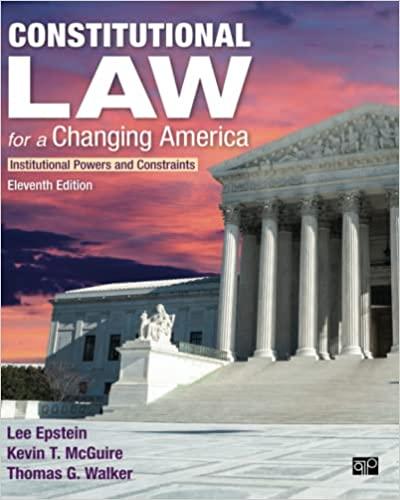Question
Remember, the value conflict is between the opponents and proponents of the death penalty based on their respective value preferences. Assumptions are unstated beliefs; they
Remember, the value conflict is between the opponents and proponents of the death penalty based on their respective value preferences. Assumptions are unstated beliefs; they are not stated in the article.Can you support or refute these assumptions with additional quality evidence?
Please answer:
1. What is the value conflict in the Death penalty article? Proponent values preferences vs Opponent value preferences.
2. What are theassumptions?
For example:By definition assumptions are unstated. When the author states:"Even life in prison does not guarantee that they will not kill again". Certain murderers have murdered again in prison, so this claim is factual.It is not an assumption that they will not murder again because it is stated by the author. Someassumptions arethat:
1. This is a prevalent situation and (The actual murder rate in prison is far less than 1%.)
2. That it can only be prevented by implementing the death penalty. (However,states without or without the death penaltyhave managed violent prisoners by building super max prisons and isolating these prisoners from the general population.)
Do you see that the assumption is derived from the factual claim as an unstated belief that supports the explicit reasoning.We can refute the premises (assumptions) upon which this claim is made by identifying the underlying assumptions and producing counterarguments.
ARTICLE TO BE USED :
A Case for the Death Penalty
(1) Troy Davis, 42, died at 11:08 p.m. according to the Georgia Department of Corrections.(2) His death by lethal injection came 19 years after he was convicted by a jury of his peers for the brutal murder of off duty police officer Mark MacPhail.
(3) Moments before his execution, Davis reportedly told the family of Mr. MacPail, "I'm not the one who personally killed your son, your father, your brother. I am innocent." (4) Mr. Davis' newfound reverence for life, stems in no small part, from the fact that he was about to lose his own. (5) Life is precious and the death penalty just reaffirms that fact.
(6) I support the death penalty for cop killers and heinous crimes of murder.(7) The death penalty is a deterrent. (8) Without a doubt, Mr. Davis will never kill again.(9) We don't have to like the death penalty in order to support it.(10) We must fight fire with fire.(11) If someone comes down with cancer, it may be necessary to take radical steps to cure the cancer: radical surgery, radiation, and chemotherapy.(12) The disease in this case is injustice.(13) Should this cop killer be given clemency?(14) We may not like the death penalty, but it must be available for such heinous crimes; otherwise, we are giving criminals, like Mr. Davis, a license to kill.
(15) The evidence is clear.(16) When executions went down, the number of murders went up.(17) Looking at the data from 1950-2002, the murder rate went from 4.6 per 100,000 population in 1951 to 10.2 per 100,000 population in 1980, as executions went to zero during the period the Supreme Court declared capital punishment unconstitutional.(18) Execution resumed in 1977.(19) As you can see, the murder rate once again declined (see chart below).
(20) Opponents of the death penalty often make the argument that we might kill an innocent person.(21) Mark MacPail was an innocent person who was executed by Mr. Davis.(22) He received no appeals to the Supreme Court; no appeals for clemency.(23) Mr. Davis killed in cold blood. (24) It is fallacy to argue that the death penalty should be abolished because an innocent person might die.(25) Innocent persons are dying all the time; however, only the murderers have the chance to appeal their sentence.
(26) In 2010, fifty-six police officers were killed in the line of duty in the US. (27)
No doubt by someone who had murdered before. (28) Even life in prison does not guarantee that they will not kill again. (29) All too often, these individuals kill again in prison.
(30) Life without parole does not always mean life without parole. (31) California is about to release teen murderers, including cop killers, who were sentenced to life without parole for their crimes.
(32) When we lower the penalty for murder, it diminishes regard for the value of the victim's life. (33) Support for the death penalty comes from a surprising group of peopleKant, Locke, Hobbes, Rousseau, Montesquieu, and Mill agreed that natural law properly authorizes the State to take life in order to administer justice. (34) Washington, Jefferson, and Franklin endorsed it. Abraham Lincoln authorized executions for deserters in wartime. (35) Alexis de Tocqueville, the author of Democracy in America, believed that the death penalty was essential to the support of social order. (36) The United States Constitution condemns cruel and inhuman punishment, but does not condemn capital punishment.
(37) Rick Perry stated that," Texas has a very thoughtful, lengthy, and clear process, which ensures everyone a fair hearing, so there is no need to lose sleep over the possibility of executing an innocent person". (38) The appeals process is indeed lengthy.(39) Mr. Davis had 19 years of appeals and the Supreme Court reaffirmed his guilt. (40) Finally justice has been served.
Step by Step Solution
There are 3 Steps involved in it
Step: 1

Get Instant Access to Expert-Tailored Solutions
See step-by-step solutions with expert insights and AI powered tools for academic success
Step: 2

Step: 3

Ace Your Homework with AI
Get the answers you need in no time with our AI-driven, step-by-step assistance
Get Started


